

Cosmopolitisme. Universalisme. Social Macrodynamics. Human society is a complex nonequilibrium system that changes and develops constantly.

Complexity, multivariability, and contradictoriness of social evolution lead researchers to a logical conclusion that any simplification, reduction, or neglect of the multiplicity of factors leads inevitably to the multiplication of error and to significant misunderstanding of the processes under study. The view that any simple general laws are not observed at all with respect to social evolution has become totally predominant within the academic community, especially among those who specialize in the Humanities and who confront directly in their research all the manifold unpredictability of social processes. A way to approach human society as an extremely complex system is to recognize differences of abstraction and time scale between different levels. This book discusses general regularities of the World System growth.
dN/dt = B -- D, (0.1) dN/dt = B -- D -- div J, (0.1') Civilisation universelle. Cosmopolitanism. Cosmopolitanism is the ideology that all human beings belong to a single community, based on a shared morality.
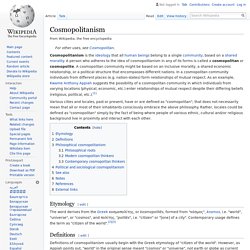
A person who adheres to the idea of cosmopolitanism in any of its forms is called a cosmopolitan or cosmopolite. A cosmopolitan community might be based on an inclusive morality, a shared economic relationship, or a political structure that encompasses different nations. In a cosmopolitan community individuals from different places (e.g. nation-states) form relationships of mutual respect. As an example, Kwame Anthony Appiah suggests the possibility of a cosmopolitan community in which individuals from varying locations (physical, economic, etc.) enter relationships of mutual respect despite their differing beliefs (religious, political, etc.).[1] Various cities and locales, past or present, have or are defined as "cosmopolitan"; that does not necessarily mean that all or most of their inhabitants consciously embrace the above philosophy.
Pre-P2P perspectives: Cosmopolitanism. Alter-Globalization. Mondialisme.org. Category:Globalization-related journals. Village Global. Global village (term) Global Village is a term closely associated with Marshall McLuhan,[1] popularized in his books The Gutenberg Galaxy: The Making of Typographic Man (1962) and Understanding Media (1964).
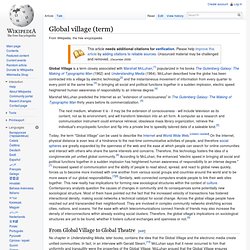
McLuhan described how the globe has been contracted into a village by electric technology[2] and the instantaneous movement of information from every quarter to every point at the same time.[3] In bringing all social and political functions together in a sudden implosion, electric speed heightened human awareness of responsibility to an intense degree.[4] MM04. World Citizen... The Globalist. G Brown: Wiring a web for global good. Globalisation isn't just about profits. It's about taxes too. The world looked on agog as Tim Cook, the head of Apple, said his company had paid all the taxes owed – seeming to say that it paid all the taxes it should have paid.

There is, of course, a big difference between the two. It's no surprise that a company with the resources and ingenuity of Apple would do what it could to avoid paying as much tax as it could within the law. While the supreme court, in its Citizens United case seems to have said that corporations are people, with all the rights attendant thereto, this legal fiction didn't endow corporations with a sense of moral responsibility; and they have the Plastic Man capacity to be everywhere and nowhere at the same time – to be everywhere when it comes to selling their products, and nowhere when it comes to reporting the profits derived from those sales.
It is not even true that higher corporate tax rates would necessarily significantly decrease investment. Gordon Brown: Global ethic vs. national interest. Système-monde. World-systems theory. A world map of countries by trading status, late 20th century, using the world system differentiation into core countries (blue), semi-periphery countries (purple) and periphery countries (red).
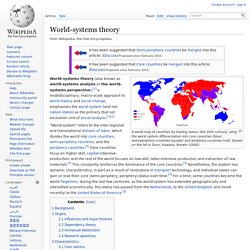
Based on the list in Dunn, Kawana, Brewer (2000). World-systems theory (also known as world-systems analysis or the world-systems perspective),[1] a multidisciplinary, macro-scale approach to world history and social change, emphasizes the world-system (and not nation states) as the primary (but not exclusive) unit of social analysis.[1][2] Background[edit] Immanuel Wallerstein has developed the best-known version of world-systems analysis, beginning in the 1970s.[4][5] Wallerstein traces the rise of the capitalist world-economy from the "long" sixteenth century (c. 1450-1640). Many other scholars have contributed significant work in this "knowledge movement".[2] Origins[edit] JOURNAL OF WORLD-SYSTEMS RESEARCH. WorldSystem.pdf (Objet application/pdf) World-system. World-systems are usually larger than single countries (nations), but do not have to be global.
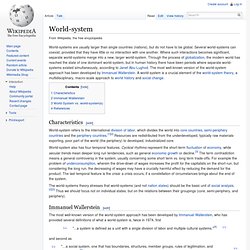
Planetary phase of civilization. The planetary phase of civilization is a concept defined by the Global Scenario Group (GSG), an environmental organization that specializes in scenario analysis and forecasting.
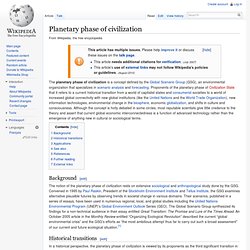
Proponents of the planetary phase of Civilization State that it refers to a current historical transition from a world of capitalist states and consumerist societies to a world of increased global connectivity with new global institutions (like the United Nations and the World Trade Organization), new information technologies, environmental change in the biosphere, economic globalization, and shifts in culture and consciousness. Although the concept is hotly debated in some circles, most reputable scientists give little credence to the theory and assert that current global economic interconnectedness is a function of advanced technology rather than the emergence of anything new in cultural or sociological terms.
Background[edit] Historical transitions[edit] Applications[edit] See also[edit] Club of Budapest: Welcome. Agence Global. Collegium International. YaleGlobal Online Magazine. Transnational Institute. YaleGlobal Online. Hypermonde. Un article de Wikipédia, l'encyclopédie libre. Sur les autres projets Wikimedia : hypermonde, sur le Wiktionnaire Étymologiquement (racine grecque « huper »), un hypermonde est un monde qui se trouve « au-dessus » ou « au-delà » de notre monde. L'adjectif « hypermondial » est utilisé pour désigner tout ce qui s'y rattache. L'histoire de ce terme fait apparaître deux sens différents, selon le contexte dans lequel il est utilisé. Transformation of Sovereignty and Globalization.
Page d'accueil du club de L'Hypermonde. Bienvenue sur le site de l'Hypermonde : l'espace immatériel créé par la convergence des technologies de l'information.

Il propose un champ d'activité à l'individu et à la communauté. Corps et esprit s'y expriment ensemble. Le club de l'Hypermonde est un cercle de réflexion qui se réunit chaque semaine pour réfléchir aux impacts humains et aux enjeux philosophiques de ce nouvel univers. Vous trouverez sur ce site le compte rendu des travaux de ce club. Nous n'avons rien à vendre. Sous la rubrique News, vous trouverez des nouvelles. Catégorie:Mondialisation. Mundialization. Mondialisme. Mondialisation. Global Research TV – Centre for Research on Globalization. Mondialisation. Un article de Wikipédia, l'encyclopédie libre.
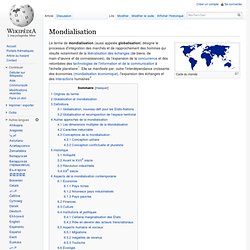
Carte du monde. Globalization. Globalisation (or globalization) is the process of international integration arising from the interchange of world views, products, ideas, and other aspects of culture.[1][2] Advances in transportation and telecommunications infrastructure, including the rise of the telegraph and its posterity the Internet, are major factors in globalization, generating further interdependence of economic and cultural activities.[3] Though scholars place the origins of globalization in modern times, others trace its history long before the European age of discovery and voyages to the New World.
Some even trace the origins to the third millennium BCE.[4][5] In the late 19th century and early 20th century, the connectedness of the world's economies and cultures grew very quickly. Overview[edit] Village planétaire. Un article de Wikipédia, l'encyclopédie libre.

Le village planétaire, ou village global (en anglais Global Village), est une expression de Marshall McLuhan, tirée de son ouvrage The Medium is the Message paru en 1967, pour qualifier les effets de la mondialisation, des médias et des technologies de l'information et de la communication. Selon ce philosophe et sociologue, « les moyens de communication audiovisuelle modernes (télévision, radio, etc.) et la communication instantanée de l'information mettent en cause la suprématie de l’écrit ». Dans ce monde unifié, où l’information véhiculée par les médias de masse fondent l’ensemble des micro-sociétés en une seule.
Il n’y aurait selon lui désormais plus qu’une culture, comme si le monde n’était qu’un seul et même village, une seule et même communauté « où l'on vivrait dans un même temps, au même rythme et donc dans un même espace ». Defining Globalization. Human societies across the globe have established progressively closer contacts over many centuries, but recently the pace has dramatically increased. Jet airplanes, cheap telephone service, email, computers, huge oceangoing vessels, instant capital flows, all these have made the world more interdependent than ever. Multinational corporations manufacture products in many countries and sell to consumers around the world. Money, technology and raw materials move ever more swiftly across national borders. Category:Globalization. Globalization (or globalisation) is social change associated with increased connectivity among societies and their elements and the explosive evolution of transportation and telecommunication technologies to facilitate international cultural and economic exchange.
The term is applied in various social, cultural, commercial and economic contexts. To browse the category, you may prefer to use the Globalization Category Tree. Subcategories This category has the following 19 subcategories, out of 19 total. Globalization - Bertelsmann Future Challenges. From Bertelsmann Future Challenges Globalization might be defined as the integration of national markets into one international economy. With lower transportation and communication costs, liberalization of trade and investment, and increasing technology transfer, globalization has continued unimpeded over the last 35 years.
For many people the fears associated with globalization are greater than its potential benefits. Globalization poses clear challenges: Economic and technological developments in China or India, for example, endanger jobs in developed countries. World currency. The euro and US Dollar are by far the most used currencies in terms of global reserves. In the foreign exchange market and international finance, a world currency, supranational currency, or global currency refers to a currency that is transacted internationally, with no set borders. Historical and current world currencies[edit] Spanish dollar (17th – 19th centuries)[edit] In the 17th and 18th century, the use of silver Spanish dollars or "pieces of eight" spread from the Spanish territories in the Americas westwards to Asia and eastwards to Europe forming the first worldwide currency.[1][2] Spain's political supremacy on the world stage, the importance of Spanish commercial routes across the Atlantic and the Pacific, and the coin's quality and purity of silver helped it become internationally accepted for over two centuries.